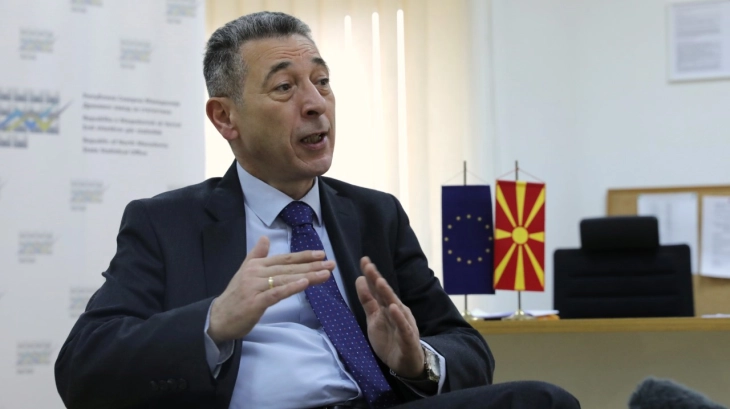Simovski claims strong pressure from Bulgaria before Albanian census
- Director of the State Statistical Office Apostol Simovski stated that the fact that part of the Albanian population identified as Bulgarians during the census due to significant Bulgarian efforts is not a failure on the part of Albania, and he noted that the census could potentially be repeated.
- Post By Silvana Kocovska
- 12:22, 7 July, 2024

Skopje, 7 July 2024 (MIA) - Director of the State Statistical Office Apostol Simovski stated that the fact that part of the Albanian population identified as Bulgarians during the census due to significant Bulgarian efforts is not a failure on the part of Albania, and he noted that the census could potentially be repeated.
“Everywhere in the world, in countries where ethnic identity data is collected, Simovski emphasizes that this information must reflect the free will of the person providing it,” Simovski said.
“I affirm, as I was fully informed about all the census preparations in Albania, that this was not allowed except in some incidental cases which would be addressed. This situation represents the actual state of how these people declared themselves, and in this case, we cannot blame the Institute of Statistics of Albania,” Simovski said in an RFE/RL interview.
Simovski also stated that they had been in regular contact with their Albanian colleagues and that they did not expect this outcome either.
"Although I somewhat expected it, the problem was different. During the period before the census was announced, there was very intense, let’s say, very strong activity from the Bulgarian state to agitate, buy, and offer citizenship opportunities. Unfortunately, for economic reasons and primarily due to the desire to leave the country and have a passport that would not cause problems, many people accepted that challenge. However, we cannot blame the state of Albania for that. Perhaps we can blame them for allowing such pressure, but that is already a political issue, and I cannot interfere in that area," Simovski said.
Regarding calls to repeat the entire operation, Simovski emphasizes that it is possible but very expensive, and that the decision rests with the Albanian government, pointing out that we also repeated our census in 1991 as an example.
“You know, these operations are very expensive. But what I am confident about, and I cannot blame my colleagues in Albania for, is that according to the rules, the methodological solutions, and all the standards, which I am fully aware of, no one influenced the data. It is a personal declaration. You cannot force someone to declare something, and you cannot say that there were no Bulgarians before and that they should not declare themselves as such,” Simovski added.
Regarding the fact that there are people who are already testifying that they only declared themselves as Bulgarians but do not actually feel that way, Simovski noted that this can indeed happen.
“It is not surprising that this happens. The propaganda is very intense and does not do any good for anyone. Unfortunately, this happens, and many people accept it primarily for economic reasons, but sometimes also for lucrative ones. We cannot interfere in this matter, as it is a very personal issue. What bothers me the most is that the same people who acted contrary to national feelings now appear as the greatest defenders of national identity,” Simovski said.
Regarding the announced abolition of the ‘balancer,’ Simovski says that it is a political tool.
“The balancer is a political tool, and I avoid making political statements as I prefer to stick to expertise. However, I went public, and unfortunately, I might have been the only one, to say that the census data was being misused because relevant data for the structure of the population are the data on the resident population. We tried to gather as much information as possible about our citizens who do not live in the country, but they are considered non-resident population. About 450,000 people remained uncovered. Unfortunately, my intervention was the only one, and nothing changed,” Simovski said.
Simovski also expressed doubt that the number of people leaving the country is much higher than what was reported in the audit report. He emphasized that they have long been pointing out that emigration is a key demographic problem, and the state has had no accurate data on the causes or strategy for 30 years.
"We are making every effort to get an approximate number and structure of those who emigrate annually, and it surprises me where such precise data comes from. What concerns me is that this number is very small. Our estimates suggest that around 15,000 people leave the country each year," Simovski stated.
Photo: MIA archive







